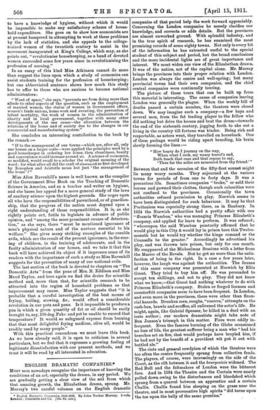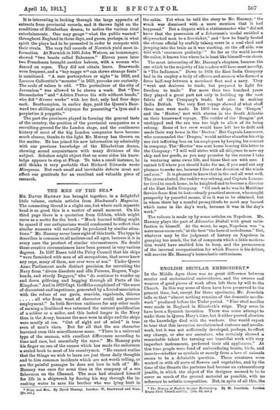ENGLISH DRAMATIC COMPANIES.* MOST men nowadays recognise the importance of
knowing the conditions of an art, especially the drama, in any period. We are gradually getting a clear view of the soil from which that amazing growth, the Elizabethan drama, sprang. Mr. Murray's two careful volumes on the English dramatic
• English Dramatic Companies, 1568-1642. By John Tucker Murray. 2 vols. London : Constable and Co. [31e. 6d. net.]
companies of that period help the work forward appreciably. Concerning the London companies he merely clarifies our knowledge, and corrects or adds details. Bat the provinces are almost unworked ground. With splendid industry, and in the true spirit of research, he has examined the most promising records of some eighty towns. Not only is every bit of the information he has extracted useful to the special student of this subject and period, but the broad conclusions and the more incidental lights are of great importance and interest. We must widen our view of the Elizabethan drama.
It was of the nation, not of the capital alone. Mr. Murray brings the provinces into their proper relation with London.
London was always the centre and well-spring; but many provincial towns had their own companies, and the chief central companies were continually touring.
The picture of these tours that can be built up from this material is interesting. The cause of companies leaving London was generally the plague. When the weekly bill of deaths passed a certain number, the theatres were closed down. We may imagine such a company—a few boys and several men, from the fat leading player to the fellow who did nothing but drive the horses and beat the drum—towards the end of the sixteenth century, jogging forth to eke out a living in the country till fortune was kinder. Being rich and respectable, as actors went, they travelled on horseback. One of them perhaps would be riding apart brooding, his brain slowly forming the lines :— " How heavy do I journey on the way,
When what I seek, my weary travel's end, Doth teach that ease and that repose to say, ' Thus far the miles are measured from thy friend."
Between that and the occasion of the fifty-first sonnet might lie many weary months. They sojourned at the various towns for periods of from one to forty days. It was a precarious life. Sometimes companies "broke," or sold their horses and pawned-their clothes, though such calamities were
not confined to the provinces. Occasionally the town authorities refused permission to play. Norwich seems to have been distinguished for such behaviour. It may be that Puritanism was especially strong there, as in Banbury. In 1624 the Norwich authorities had a pretty affair with one " ffrancis Wambus," who was managing Princess Elizabeth's company, and applied for leave to perform. It was refused; "whereupon the said Wambus pemtorily affirmed that he would play in this City & would lay in prison here this Twelve- moneth but he would try whether the kings comand or the Counsells be the greater." Accordingly he advertised his play, and was thrown into prison, but only for one month.
He reappeared at the Michaelmas Sessions with a letter from the Master of the Revels. But he got no more than the satis- faction of being in the right. In a case a few years later, however, the laugh was against the authorities. The license of this same company was presented at Norwich by Ellis Guest. They tried to buy him off. He was persuaded to accept ten shillings, and not to play. They did not know what we know,—that Guest had nothing whatever to do with Princess Elizabeth's company. Stolen or forged licenses and counterfeit companies seem to have been frequent. In London, and even more in the provinces, there were other than finan- cial hazards. Drunken men, roughs, "roarers," attempts on the cash-box, brawls and scuffles, all enlivened the actor's life. He
might, again, like Gabriel Spenser, be killed in a duel with an irate author ; our modern dramatists might take note of Ben Jonson's triumph in this matter. Fires were oddly in-
frequent. Even the famous burning of the Globe occasioned no loss of life, the greatest sufferer being a man who "had his breeches set on fire, that would perhaps have broyled him, if he had not by the benefit of a provident wit put it out with bottled ale."
The riots and general rowdyism of which the theatres were too often the centre frequently sprang from collective feuds.
The players, of course, were increasingly on the side of the Court, as the rift between it and the bourgeoisie widened. The
Red Bull and the feltmakers of London were the bitterest foes. And in 1584 the Theatre and the Curtain were nearly pulled down owing to the disturbances and bloodshed which sprang from a quarrel between an apprentice and a certain Challis. Challis found him sleeping on the grass near the theatre, and in most provocative high spirits "did turns upon the toe upon the belly of the same prentice." It is interesting in looking through the large appendix of extracts from provincial records, and it -throws light on the conditions of Elizabethan drama, to notice the various rival entertainments. One may gauge "what the public wanted" throughout England in those days, and guess, perhaps, in what spirit the plays had to be presented in order to compete with their rivals. The very full records of Norwich yield most in- formation. At Norwich in 1605 John Watson, an ironmonger, showed "two beasts called Babonnes." Eleven years later two Frenchmen brought another baboon, with a woman who danced on ropes. They did not obtain leave. Bearwards were frequent, and a "bay nagge wc" can sheave strange feats" is mentioned. "A rare portrayetnre or sight" in 1626, and Larzeus Colleretto's "monster" in 1639, provoke our curiosity. The scale of values is odd. " The portraiture of the city of Jerusalem " was allowed to be shown a, week. But " Two Dromedaries " and " Adrian Provoe his wife without hands," who did " diverse works" with her feet, only had four days each. Southampton, in earlier days, paid the Queen's Bear- ward two shillings and sixpence for presenting "a lyon and a porpintine & poppetts."
The part the provinces played in forming the general taste of the country, the position of the provincial companies as a recruiting-ground for the London stage, and the continuous history of most of the big London companies have become much clearer, thanks to the light Mr. Murray has thrown on the matter. He has joined his new information up admirably with our previous knowledge of the Elizabethan drama, showing sound acquaintance with many divisions of the subject. Scholars might object that on some sides his know- ledge appears to stop at Fleay. To take a small instance, he still thinks it very probable that Richard Edwards wrote Misogonns. But such small and inevitable defects must not affect our gratitude for an excellent and valuable piece of research.





































 Previous page
Previous page